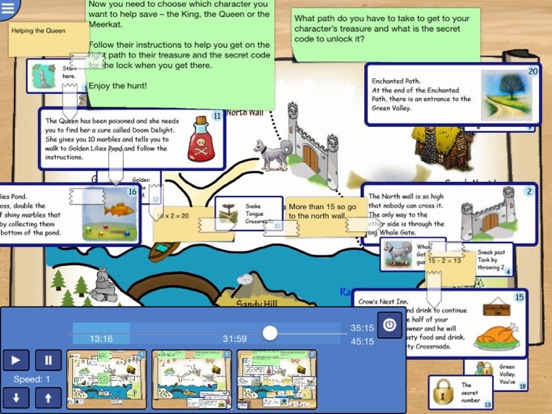Marble Land (Computing/Maths)
iPad / Education
Digital Mysteries: Marble Land KS2 is a problem-solving app that is unique in allowing pairs to work together on one iPad with a task mapped to computing curriculum topics; variables, sequences and selections.
Students must choose one character to help. Will it be the Meerkat, King, or Queen of Marble Land? To decide, they must first read small illustrated slips of information, then go on a treasure hunt around the kingdom.
As they do so, they actually:
• follow a sequence of instructions
• use and manipulate a variable
• make selections (logical decisions) based on the value of the variable
The students' choice of character changes the value (the number) of marbles they start off with and therefore the sequence to follow and the final destination (where the treasure is). This engages students as they can decide on the character they like the most, but also helps reflect the concept of initialisation values and how they affect the execution of any program/algorithm.
The link between the programming concepts and the mystery can either be explained afterwards to aim for the 'aha' moment, or before the mystery so that students are aware of their use during the hunt.
Whilst on their missions, they are also using mathematical skills, e.g. when they get to Lilies Pond they have to double the amount of marbles in their bag as they pick them up from the water.
Alongside the colourful slips and full screen map to guide the students, they have access to exciting tools to help them once in the 2nd stage. This includes notes (to type their thoughts or calculations), arrow sticky tapes (to show a causal or chronological link), normal sticky tapes (to stick slips/notes together with general links) and groups (to help organise slips).
After students complete their hunt they can share/print a PDF report, playback the process and reflect on it, or do it again for a different character.
Who is this app for?
This is most suited to 7-11 year olds (KS2). It has three difficulty levels - medium is the default. Easy has an extra hint in the 2nd stage introduction, and hard adds three slips which briefly link to the computing concepts involved. Within the app there is a more detailed description plus four suggested learning outcomes.
What is different about Digital Mysteries?
• Truly collaborative: It is unique in that more than one student can interact with it at once
• Record of learning: Students can interact with exciting technology then share/print a PDF report of their session
• Cross-curricular: Mysteries come in various topics plus many are cross-curricular in themselves
• Reflection: Sessions are recorded so students can playback and discuss them, emphasising the importance of the process as well as the outcome
• Speaking and listening: Due to its collaborative nature, each session aligns to this learning goal plus 'group discussion and interaction'
• Engagement: Working in pairs adds to the fun experience of problem-solving
• Research: We've done years of academic research on how to make the most of touch screens for learning in general, and collaboration specifically
What does a mystery consist of?
• Illustrated slips of information: Short snippets to help students with reading
• Questions: One main question plus optional sub questions to maximise the potential of collaboration, discussion and expression of ideas
• Extras: Most tasks come with personalised hints for those who need them, e.g. suggestions for organising ideas or simpler stage introductions to ease them in
• Description: This gives teachers the information they need to plan their session including the curriculum point each task links to, the advised age range and possible learning outcomes
How can I try other mysteries?
At the bottom of the app details tab, tap 'Developer Apps' to view our current range. Many more are coming soon in KS1-4. To request one from our Mysteries Library (www.reflectivethinking.com/mysteries), email info@reflectivethinking.com
Quoi de neuf dans la dernière version ?
Fixed minor bugs.



